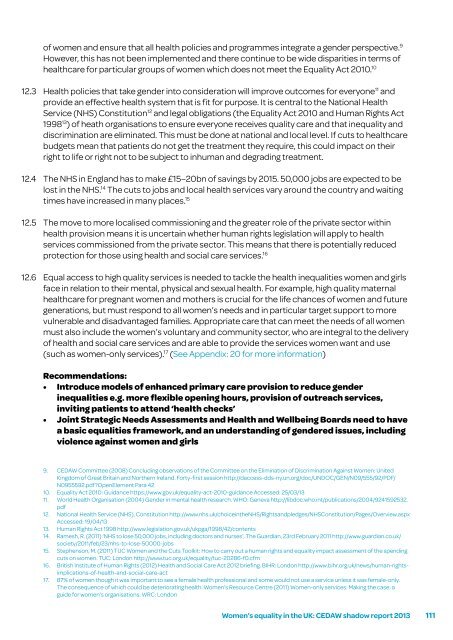Women’s equality in the UK – A health check
Women’s equality in the UK – A health check
Women’s equality in the UK – A health check
You also want an ePaper? Increase the reach of your titles
YUMPU automatically turns print PDFs into web optimized ePapers that Google loves.
12.3<br />
12.4<br />
12.5<br />
12.6<br />
of women and ensure that all <strong>health</strong> policies and programmes <strong>in</strong>tegrate a gender perspective. 9<br />
However, this has not been implemented and <strong>the</strong>re cont<strong>in</strong>ue to be wide disparities <strong>in</strong> terms of<br />
<strong>health</strong>care for particular groups of women which does not meet <strong>the</strong> Equality Act 2010. 10<br />
Health policies that take gender <strong>in</strong>to consideration will improve outcomes for everyone 11 and<br />
provide an effective <strong>health</strong> system that is fit for purpose. It is central to <strong>the</strong> National Health<br />
Service (NHS) Constitution 12 and legal obligations (<strong>the</strong> Equality Act 2010 and Human Rights Act<br />
1998 13 ) of heath organisations to ensure everyone receives quality care and that <strong>in</strong><strong>equality</strong> and<br />
discrim<strong>in</strong>ation are elim<strong>in</strong>ated. This must be done at national and local level. If cuts to <strong>health</strong>care<br />
budgets mean that patients do not get <strong>the</strong> treatment <strong>the</strong>y require, this could impact on <strong>the</strong>ir<br />
right to life or right not to be subject to <strong>in</strong>human and degrad<strong>in</strong>g treatment.<br />
The NHS <strong>in</strong> England has to make £15<strong>–</strong>20bn of sav<strong>in</strong>gs by 2015. 50,000 jobs are expected to be<br />
lost <strong>in</strong> <strong>the</strong> NHS. 14 The cuts to jobs and local <strong>health</strong> services vary around <strong>the</strong> country and wait<strong>in</strong>g<br />
times have <strong>in</strong>creased <strong>in</strong> many places. 15<br />
The move to more localised commission<strong>in</strong>g and <strong>the</strong> greater role of <strong>the</strong> private sector with<strong>in</strong><br />
<strong>health</strong> provision means it is uncerta<strong>in</strong> whe<strong>the</strong>r human rights legislation will apply to <strong>health</strong><br />
services commissioned from <strong>the</strong> private sector. This means that <strong>the</strong>re is potentially reduced<br />
protection for those us<strong>in</strong>g <strong>health</strong> and social care services. 16<br />
Equal access to high quality services is needed to tackle <strong>the</strong> <strong>health</strong> <strong>in</strong>equalities women and girls<br />
face <strong>in</strong> relation to <strong>the</strong>ir mental, physical and sexual <strong>health</strong>. For example, high quality maternal<br />
<strong>health</strong>care for pregnant women and mo<strong>the</strong>rs is crucial for <strong>the</strong> life chances of women and future<br />
generations, but must respond to all women’s needs and <strong>in</strong> particular target support to more<br />
vulnerable and disadvantaged families. Appropriate care that can meet <strong>the</strong> needs of all women<br />
must also <strong>in</strong>clude <strong>the</strong> women’s voluntary and community sector, who are <strong>in</strong>tegral to <strong>the</strong> delivery<br />
of <strong>health</strong> and social care services and are able to provide <strong>the</strong> services women want and use<br />
(such as women-only services). 17 (See Appendix: 20 for more <strong>in</strong>formation)<br />
Recommendations:<br />
• Introduce models of enhanced primary care provision to reduce gender<br />
<strong>in</strong>equalities e.g. more flexible open<strong>in</strong>g hours, provision of outreach services,<br />
<strong>in</strong>vit<strong>in</strong>g patients to attend ‘<strong>health</strong> <strong>check</strong>s’<br />
• Jo<strong>in</strong>t Strategic Needs Assessments and Health and Wellbe<strong>in</strong>g Boards need to have<br />
a basic equalities framework, and an understand<strong>in</strong>g of gendered issues, <strong>in</strong>clud<strong>in</strong>g<br />
violence aga<strong>in</strong>st women and girls<br />
9. CEDAW Committee (2008) Conclud<strong>in</strong>g observations of <strong>the</strong> Committee on <strong>the</strong> Elim<strong>in</strong>ation of Discrim<strong>in</strong>ation Aga<strong>in</strong>st Women: United<br />
K<strong>in</strong>gdom of Great Brita<strong>in</strong> and Nor<strong>the</strong>rn Ireland. Forty-first session http://daccess-dds-ny.un.org/doc/UNDOC/GEN/N09/555/92/PDF/<br />
N0955592.pdf?OpenElement Para 42<br />
10. Equality Act 2010: Guidance https://www.gov.uk/<strong>equality</strong>-act-2010-guidance Accessed: 25/03/13<br />
11. World Health Organisation (2004) Gender <strong>in</strong> mental <strong>health</strong> research. WHO: Geneva http://libdoc.who.<strong>in</strong>t/publications/2004/9241592532.<br />
pdf<br />
12. National Health Service (NHS), Constitution http://www.nhs.uk/choice<strong>in</strong><strong>the</strong>NHS/Rightsandpledges/NHSConstitution/Pages/Overview.aspx<br />
Accessed: 19/04/13<br />
13. Human Rights Act 1998 http://www.legislation.gov.uk/ukpga/1998/42/contents<br />
14. Ramesh, R. (2011) ‘NHS to lose 50,000 jobs, <strong>in</strong>clud<strong>in</strong>g doctors and nurses’, The Guardian, 23rd February 2011 http://www.guardian.co.uk/<br />
society/2011/feb/23/nhs-to-lose-50000-jobs<br />
15. Stephenson, M. (2011) TUC Women and <strong>the</strong> Cuts Toolkit: How to carry out a human rights and <strong>equality</strong> impact assessment of <strong>the</strong> spend<strong>in</strong>g<br />
cuts on women. TUC: London http://www.tuc.org.uk/<strong>equality</strong>/tuc-20286-f0.cfm<br />
16. British Institute of Human Rights (2012) Health and Social Care Act 2012 brief<strong>in</strong>g. BIHR: London http://www.bihr.org.uk/news/human-rightsimplications-of-<strong>health</strong>-and-social-care-act<br />
17. 87% of women though it was important to see a female <strong>health</strong> professional and some would not use a service unless it was female-only.<br />
The consequence of which could be deteriorat<strong>in</strong>g <strong>health</strong>. <strong>Women’s</strong> Resource Centre (2011) Women-only services: Mak<strong>in</strong>g <strong>the</strong> case: a<br />
guide for women’s organisations. WRC: London<br />
<strong>Women’s</strong> <strong>equality</strong> <strong>in</strong> <strong>the</strong> <strong>UK</strong>: CEDAW shadow report 2013 111


